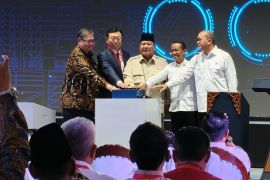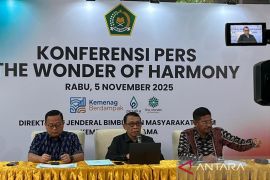"The current price of salt is very low and imports have affected the price of domestically produced salt," the Secretary General of the Pamekasan Salt Commission, Yoyok R Effendi said while staging a demonstration in front of the Ministry of Trade on Wednesday.
Effendi said farmers had called on the government to stop salt imports for good and to set up a salt task force to supervise its circulation in different sections of the food industry that uses imported salt.
"Multifarious industrial food salt is confusing. It is leaked to the consumer market. The same thing also happens with industrial salt," he said.
Last week, the Indonesian Traditional Fishermen Association (KNTI) had requested the new Coordinating Minister for Maritime Affairs, Rizal Ramli, to investigate the alleged presence of a salt cartel in the country.
"This is an important issue that has to be solved in an effort to realize the governments initiative to ensure food sovereignty," KNTI General Chairman, Muhammad Riza Damanik, stated on Thursday last week.
Damanik noted that the alleged presence of a cartel in the salt business was the main factor hindering efforts to create sovereignty in the salt production sector. He remarked that the cartel was strong as it was concealing itself by taking advantage of the unharmonious relations between the Ministry of Marine Affairs and Fisheries and the Ministry of Industry.
The salt issue is also believed to be linked to the issue of storage time at Indonesian ports, thereby causing delays, which disadvantage and reduce the competitiveness of the nation. It is believed that several officials from inter-related ministries are involved.
Marine Affairs and Fisheries Minister Susi Pudjiastuti had earlier expressed hope that the investigation into the storage time conducted by the Jakarta police would also focus on the import of salt.
"I hope the police also conduct an investigation into the import of salt in the country," Minister Pudjiastuti had stated on August 5.
According to Minister Pudjiastuti, salt importers did not express any goodwill during the meeting held between them and salt farmers at home.
"We intended to discuss the challenges faced in making the country a self-reliant producer, but the salt importers showed no goodwill," Minister Pudjiastuti said.
She admitted that the reason behind the importers response was that the quality of salt produced domestically by the farmers is not good. However, they should control their imports to prevent an influx of imported salt during the countrys salt harvest season.
In addition, the Ministry of Trade regulates when salt imports can be carried out, she added.
"We believe that the salt importers ignore it (the regulation) and do not care about the fate of the farmers. They are only concerned about making profit," she remarked.
Moreover, the minister stated that the importers earned considerable profits. For instance, salt from Australia costs Rp500 per kilogram, whereas the price of salt in the domestic market is Rp750 to Rp1,500 per kilogram.
"I feel as though I am not respected, and that the states aspirations are not appreciated," Pudjiastuti said.
She also pointed out that if they did not pay attention to this issue, domestic salt businesses would only import more of the commodity. As a result, various sides will show lesser interest in investing in and working to advance the domestic salt business.
"This is the main reason why the interests of farmers are being harmed. The price of the commodity at the farmers level will remain very low," she noted. (*)
Editor: Heru Purwanto
Copyright © ANTARA 2015










